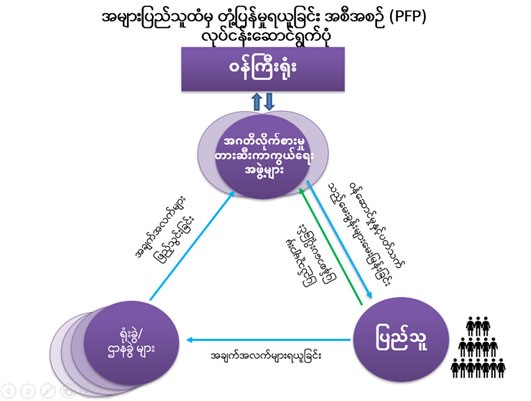“အဂတိပယ်ခွာ ပြည်သာယာဖို့ ပူးပေါင်းဆောင်ရွက်ကြပါစို့”
- Wed, 10 May 2023
၁။ မြန်မာနိုင်ငံတွင် အဂတိလိုက်စားမှုတိုက်ဖျက်ရေးဉပဒေကို ၇-၈-၂၀၁၃ ရက်နေ့တွင် ပြဋ္ဌာန်းခဲ့ကာ အဂတိလိုက်စားမှုတိုက်ဖျက်ရေးကော်မရှင်ကို ၂၅-၂-၂၀၁၄ ရက်နေ့တွင် စတင်ဖွဲ့စည်းခဲ့ပါသည်။ အဂတိလိုက်စားမှုတိုက်ဖျက်ရေးကို အမျိုးသားရေးတာဝန်တစ်ရပ်အဖြစ် ခံယူလျက် သန့်ရှင်းသောအစိုးရနှင့် ကောင်းမွန်သော အုပ်ချုပ်ရေးစနစ်တို့ကို အကောင်အထည်ဖော် ဆောင်ရွက်နိုင်ရေး ကြိုးပမ်းဆောင်ရွက်ခဲ့သည်မှာ သက်တမ်းကာလ ၇ နှစ်ကျော်ပင်ရှိခဲ့ပြီ ဖြစ်ပါသည်။ ယခုအခါ အဂတိလိုက်စားမှုတိုက်ဖျက်ရေး လုပ်ငန်းများကို အတိုင်းအတာတစ်ခုအထိ အောင်မြင်အောင် ကြိုးပမ်းဆောင်ရွက်ခဲ့ပြီး ဖြစ်ပါသည်။
၂။ ကော်မရှင်အနေဖြင့် အဂတိလိုက်စားမှုတိုက်ဖျက်ရေးလုပ်ငန်းများကို တားဆီးကာကွယ်ခြင်း၊ စုံစမ်းစစ်ဆေးခြင်းနှင့် ပြည်သူသို့အသိပညာပေးခြင်းစသည့် နည်းလမ်း ၃ သွယ်ဖြင့် ဆောင်ရွက်လျက် ရှိပါသည်။ အဂတိလိုက်စားမှု တားဆီးကာကွယ်ရေးလုပ်ငန်းစဉ်သည် အဂတိလိုက်စားမှုများကြောင့် ဆုံးရှုံးမှုများမဖြစ်မီ ကြိုတင်ကာကွယ်သည့် လုပ်ငန်းစဉ်ဖြစ်သဖြင့် အဂတိလိုက်စားမှုများကြောင့် အစိုးရဌာန အဖွဲ့အစည်းများ၏ ပုံရိပ်ကျဆင်းမှုနှင့် ပြည်သူလူထု၏ ယုံကြည်မှု လျော့နည်းကျဆင်းလာစေမှုတို့ကို အချိန်မီဟန့်တားနိုင်မည့် လုပ်ငန်းစဉ်ဖြစ်ပြီး ဉပဒေအရ အရေးယူ အပြစ်ပေးမှုများကိုလည်း လျော့နည်းစေမည်ဖြစ်ပါသည်။
၃။ အဂတိလိုက်စားမှုတိုက်ဖျက်ရေးဉပဒေ ပုဒ်မ ၁၆ (ဋ) တွင် “အဂတိလိုက်စားမှု တားဆီးကာကွယ်ရေး၊ လုပ်ပိုင်ခွင့်အာဏာရှိသူများ၏ ရိုးသားဖြောင့်မတ်သည့် စိတ်ဓာတ်ကို ပိုမိုမြှင့်တင်ရေးနှင့် အဂတိလိုက်စားမှု တိုက်ဖျက်ရေးတို့တွင် ပြည်သူအများပါဝင်နိုင်ရေးအတွက် သင့်လျော်သော အစီအမံများချမှတ်၍ ဆောင်ရွက်ခြင်း”ဟု ပြဋ္ဌာန်းထားခဲ့ပါသည်။ ကော်မရှင်အနေဖြင့် အဂတိလိုက်စားမှု တားဆီးကာကွယ်ခြင်း လုပ်ငန်းစဉ်ကို အကောင်အထည်ဖော်ဆောင်ရွက်ရာတွင် ထိရောက်ခိုင်မာသော အခြေခံကောင်းများ တည်ဆောက်နိုင်ရေးအတွက် ပြည်သူလူထုတစ်ဉီးချင်း ကြုံတွေ့လျက်ရှိသော အသေးစားအဂတိလိုက်စားမှုများကို လျော့နည်းကျဆင်းစေရန် စီမံဆောင်ရွက်လျက် ရှိပါသည်။ ပြည်သူလူထု၏ လိုအပ်ချက်များနှင့်အညီ အစိုးရဌာနအဖွဲ့အစည်းများက လုပ်ဆောင်ပေးနေသော ဝန်ဆောင်မှုများကို ပိုမိုပြည့်စုံကောင်းမွန်စေရန် ရည်ရွယ်၍ အဂတိလိုက်စားမှုတိုက်ဖျက်ရေး ကော်မရှင်ရုံးအပါအဝင် ပြည်ထောင်စု ဝန်ကြီးဌာန/အဖွဲ့အစည်းများတွင် အဂတိလိုက်စားမှု တားဆီးကာကွယ်ရေးအဖွဲ့ (Corruption Prevention Unit-CPU) များကို ၂၀၁၉ ခုနှစ် မတ်လတွင် ရှေ့ပြေးစီမံကိန်းအဖြစ် ဝန်ကြီးဌာန/အဖွဲ့အစည်း ၁၄ ခုတွင် စတင်ဖွဲ့စည်း ဆောင်ရွက်ခဲ့ရာ ယခုအခါ ပြည်ထောင်စုဝန်ကြီးဌာန/အဖွဲ့အစည်း ၃၇ ခုတွင် အဂတိလိုက်စားမှု တားဆီးကာကွယ်ရေးအဖွဲ့များ ဖွဲ့စည်းထားပြီး ဖြစ်ပါသည်။
၄။ ၁၉-၁-၂၀၁၉ ရက်နေ့တွင် ကျင်းပပြုလုပ်ခဲ့သည့် အဂတိလိုက်စားမှု တားဆီးကာကွယ်ရေး အဖွဲ့များအတွက် မူဝါဒပိုင်းဆိုင်ရာ အလုပ်ရုံဆွေးနွေးပွဲတွင် CPU များ၏ လုပ်ငန်းတာဝန် ၃ ရပ်ကို ချမှတ်နိုင်ခဲ့ပါသည်။ လုပ်ငန်းတာဝန်များမှာ (က) ဌာနအလိုက် လာဘ်ပေးလာဘ်ယူမှုနှင့် အဂတိလိုက်စားမှု ပြဿနာများကို စိစစ်ဖော်ထုတ်ရန်၊ (ခ) တွေ့ရှိလာသော ပြဿနာများကို ဉပဒေနှင့်အညီ ဖြေရှင်းရန်နှင့် (ဂ) အဂတိလိုက်စားမှု ဆက်လက် မဖြစ်ပေါ်စေရေးအတွက် တားမြစ်ထိန်းချုပ်သွားရန် တို့ဖြစ်ပါသည်။ ထို့ပြင် ၂၀၁၉ ခုနှစ် ဇူလိုင်လ ၂၄ ရက်နေ့မှ ၂၆ ရက်နေ့အထိ ကျင်းပပြုလုပ်ခဲ့သည့် CPU များအတွက် နည်းပညာဆိုင်ရာ သင်တန်းအမှတ်စဉ် (၂/၂၀၁၉) တွင် အောက်ဖော်ပြပါ လုပ်ငန်းအစီအစဉ် ၆ ရပ်ကို ချမှတ်နိုင်ခဲ့ပါသည် -
(က) ပြည်ထောင်စုဝန်ကြီးများ၊ အကြီးအကဲများ၏ ခွင့်ပြုချက်ဖြင့် အဂတိလိုက်စားမှု တားဆီး ကာကွယ်ရေးအဖွဲ့ အသီးအသီးအတွက် လုပ်ငန်းလမ်းညွှန်များကို ရေးဆွဲထားရှိရန်၊
(ခ) ပြည်ထောင်စုဝန်ကြီးများ၊ အကြီးအကဲများ၏ ခွင့်ပြုချက်ရယူလျက် ဉီးစီးဌာန/လုပ်ငန်း ဌာနများတွင် အဂတိလိုက်စားမှုတားဆီးကာကွယ်ရေးဆိုင်ရာ အချက်များပါဝင်သော တည်မြဲလုပ်ထုံးလုပ်နည်းများ (Standing Operating Procedures_ SOP) ကို သက်ဆိုင်ရာ ဌာနများက ရေးဆွဲရေးနှင့် အများပြည်သူ သိသင့်သည်များကို လက်အောက်ရုံး/ဌာနခွဲ/ ဌာနစိတ်တို့တွင် ပွင့်လင်းမြင်သာသော နည်းလမ်းများဖြင့် ထင်ရှားစွာ ရေးသားချိတ်ဆွဲ ပြသထားရန်၊ ဝက်ဘ်ဆိုက်များတွင်လည်း ထည့်သွင်း အသိပေးကြေညာရန်၊
(ဂ) အဂတိလိုက်စားနိုင်ခြေ အန္တရာယ်ရှိမှု ဆန်းစစ်ခြင်းကို အဂတိလိုက်စားမှု တားဆီး ကာကွယ်ရေးအဖွဲ့ (CPU) များက တာဝန်ယူဆောင်ရွက်ပြီး သက်ဆိုင်ရာ ပြည်ထောင် စုဝန်ကြီး၊ အကြီးအကဲများထံ တင်ပြသွားရန်၊
(ဃ) စီးပွားရေးလုပ်ငန်းများနှင့် ပတ်သက်ပြီး လာဘ်ပေးလာဘ်ယူနှင့် အဂတိလိုက်စားမှု ဖြစ်နိုင် ခြေရှိမှုမှ ကာကွယ်ရန်အတွက် အစိုးရဌာနများနှင့် ဆက်စပ်လုပ်ကိုင်သော စီးပွားရေး လုပ်ငန်းများတွင် အဂတိလိုက်စားမှု တားဆီးကာကွယ်ရေးဆိုင်ရာ ကျင့်ဝတ် များ ရေးဆွဲထားခြင်း ရှိ/မရှိ စိစစ်ရန်နှင့် ကျင့်ဝတ်ရေးသားလိုက်နာခြင်းမရှိသော စီးပွားရေးလုပ်ငန်းများနှင့် ဝယ်ယူရေး၊ ရောင်းချရေး၊ တည်ဆောက်ရေးကိစ္စများ၌ လက်ခံဆောင်ရွက်ခြင်း မပြုရန်၊
(င) တစ်ဘက်နှင့်အခြားတစ်ဘက် အခက်အခဲများ ဖြေရှင်းရန်နှင့် အထင်အမြင်လွဲမှားမှု မရှိစေရန် ဌာနဆိုင်ရာ တာဝန်ရှိသူများနှင့် သက်ဆိုင်ရာ ပုဂ္ဂလိက စီးပွားရေး လုပ်ငန်းများအကြား အဂတိလိုက်စားမှု တားဆီးကာကွယ်ရေးဆိုင်ရာ ဖိုရမ်များ ၊ ဆွေးနွေးပွဲများ ပြုလုပ် နိုင်ရေး အဂတိလိုက်စားမှုတားဆီးကာကွယ်ရေးအဖွဲ့ (CPU) များက ညှိနှိုင်းစီစဉ်ရန်၊
(စ) ပြည်ထောင်စုဝန်ကြီးများ၏ လမ်းညွှန်မှုကိုခံယူလျက် အဂတိလိုက်စားမှု တားဆီး ကာကွယ်ရေးအဖွဲ့ (CPU) များသည် အောက်ခြေရုံးဌာနခွဲများတွင် ဝန်ဆောင်မှု ရယူကြသော ပြည်သူတစ်ဉီးချင်းထံသို့ အများပြည်သူထံမှ တုံ့ပြန်မှုရယူခြင်းအစီအစဉ် (Public Feedback Programme _ PFP) နည်းပညာအသုံးပြု၍ တယ်လီဖုန်းမှ တစ်ဆင့်ဆက်သွယ်ပြီး အသေးစားအဂတိလိုက်စားမှုများကို မဖြစ်စေရန် တားဆီး ကာကွယ်ရေး စနစ်ကို ထိရောက်စွာ အသုံးပြုသွားရန်။
၅။ လုပ်ငန်းတာဝန်ပါ “အဂတိလိုက်စားမှု ဆက်လက်မဖြစ်ပေါ်စေရေးအတွက် တားမြစ်ထိန်းချုပ်သွားရန်” ဆိုသည့်အချက်နှင့် လုပ်ငန်းအစီအစဉ် ၆ ပါ “CPU များ အနေဖြင့် အောက်ခြေရုံးဌာနခွဲများတွင် ဝန်ဆောင်မှုရယူကြသော ပြည်သူတစ်ဉီးချင်းထံသို့ အများပြည်သူထံမှ တုံ့ပြန်မှုရယူခြင်းအစီအစဉ်ကို (Public Feedback Programme _ PFP) နည်းပညာအသုံးပြု၍ တယ်လီဖုန်းမှတစ်ဆင့် ဆက်သွယ်ပြီး အသေးစား အဂတိလိုက်စားမှုများကို မဖြစ်စေရန် တားဆီးကာကွယ်ရေးစနစ်ကို ထိရောက်စွာ အသုံးပြုသွားရန်” ဆိုသည့် အချက်တို့နှင့်အညီ ကော်မရှင်မှ ဉီးဆောင်ကာ ကမ္ဘာ့ဘဏ်၏ နည်းပညာ အကူအညီဖြင့် ICT နည်းပညာအခြေပြု အများပြည်သူများထံမှ တုံ့ပြန်မှုရယူခြင်း အစီအစဉ် (ICT-based Proactive Beneficiary/Citizen Engagement) (PBE) ယန္တရားကို အသုံးပြု၍ ပြည်သူများ၏ တယ်လီဖုန်းများသို့ SMS ပေးပို့၍ ဝန်ဆောင်မှုနှင့် စပ်လျဉ်းသည့် မေးခွန်းများ မေးမြန်းပြီး တုံ့ပြန်မှု ရယူခြင်းကို ပြည်ထောင်စုဝန်ကြီးဌာန/ အဖွဲ့အစည်း ၁၀ ခုရှိ အဂတိလိုက်စားမှု တားဆီးကာကွယ်ရေး အဖွဲ့များတွင် ၂၀၁၉ ခုနှစ် အောက်တိုဘာလမှ စတင်စမ်းသပ်အသုံးပြုခဲ့ပါသည်။
၆။ CPU Toolkit လုပ်ငန်းစဉ်သည် အစိုးရဌာန/အဖွဲ့အစည်းများ၏ ဝန်ဆောင်မှု လုပ်ငန်းစဉ်များ အပေါ် ပြည်သူလူထု၏ တုံ့ပြန်မှုသဘောထားများကိုရယူခြင်းဖြစ်သဖြင့် ပိုမိုသင့်လျော်သည့် အများပြည်သူ ထံမှ တုံ့ပြန်မှု ရယူခြင်းအစီအစဉ် (Public Feedback Programme- PFP) အဖြစ် အမည်ပြောင်းလဲ သုံးစွဲခဲ့ပါသည်။ ကော်မရှင်အနေဖြင့် သက်ဆိုင်ရာဝန်ကြီးဌာနက ထုတ်ပြန် ထားသော စည်းမျဉ်း၊ စည်းကမ်း များနှင့်အညီ PFP Web Portal ကို Cloud Server မှ Local Server သို့ ပြောင်းရွှေ့နိုင်ရေး ဆောင်ရွက်ခြင်း၊ Short Code “1111” အသုံးပြုနိုင်ရေး နည်းပညာပိုင်းဆိုင်ရာ စမ်းသပ်ခြင်းနှင့် PFP Web Portal အသုံးပြုရာတွင် ပိုမိုအဆင်ပြေစေရေးအတွက် Web Portal၌ ကော်မရှင်ရုံးအပါအဝင် ပြည်ထောင်စုဝန်ကြီးဌာန/အဖွဲ့အစည်းများက ပြင်ဆင်လိုသည့်အချက်များ ကို ပြင်ဆင်ခြင်းလုပ်ငန်းများ ဆောင်ရွက်နိုင်ရေးအတွက် PFP အသုံးပြု၍ တုံ့ပြန်မှုရယူခြင်း လုပ်ငန်းများကို ၂၀၂၀ ပြည့်နှစ် ဖေဖော်ဝါရီလ မှစ၍ ခေတ္တဆိုင်းငံ့ထားခဲ့ပါသည်။
၇။ ကော်မရှင်အနေဖြင့် အများပြည်သူထံမှ တုံ့ပြန်မှုရယူခြင်း အစီအစဉ် ဆောင်ရွက်ရာတွင် အော်ပရေတာများအလိုက် တူညီသော Short Code နံပါတ်တစ်ခု အသုံးပြုနိုင်ရေး ဆက်သွယ်ရေး ညွှန်ကြားမှုဉီးစီးဌာန၏ ပူးပေါင်းကူညီဖြင့် MPT၊ Telenor၊ MyTel၊ Ooredoo စသည့် ဆက်သွယ်ရေး အော်ပရေတာ ၄ ခုတို့နှင့် ညှိနှိုင်း၍ Short Code “1111” ကို အသုံးပြုပြီး နည်းပညာပိုင်းဆိုင်ရာ စမ်းသပ်ခြင်းနှင့် ဆက်သွယ်ရေးအော်ပရေတာများနှင့် ညှိနှိုင်းခြင်းတို့ကို အောင်မြင်စွာ ဆောင်ရွက်နိုင်ခဲ့သဖြင့် ကော်မရှင်အပါအဝင် ဝန်ကြီးဌာန/အဖွဲ့အစည်း ၁၃ ခုတွင် ၁-၁၁-၂၀၂၁ ရက်နေ့မှစ၍ PFP စနစ်ကို အသုံးပြုနေပြီ ဖြစ်ပါသည်။
၈။ အဂတိလိုက်စားမှုသည် ဝန်ဆောင်မှုလုပ်ငန်းများကို အဟန့်အတားဖြစ်စေရုံသာမက အစိုးရ ဌာနများအပေါ် အများပြည်သူ၏ ယုံကြည်မှုကို ပျက်ယွင်းစေသဖြင့် ဌာနများအလိုက် ပြုပြင်ရန် လိုအပ်နေသည့် အားနည်းချက်များကို အချိန်မီပြုပြင်နိုင်ရန်၊ အသေးစား အဂတိလိုက်စားမှုများကို လျှော့ချနိုင်ရန်၊ အစိုးရအဖွဲ့အစည်းနှင့် ပြည်သူလူထုအကြားယုံကြည်မှုတည်ဆောက်ရန်နှင့် သက်ဆိုင်ရာ ဉပဒေ၊ စည်းမျဉ်းစည်းကမ်း၊ လုပ်ထုံးလုပ်နည်းများတွင် အဂတိလိုက်စားနိုင်ခြေ အန္တရာယ်ရှိမှု ဆန်းစစ်ခြင်း (Corruption Risk Assessment -CRA) လုပ်ငန်းစဉ်ကို အထောက်အကူပြုစေရန် တို့ကို ရည်ရွယ်၍ PFP စနစ်ကို အကောင်အထည်ဖော် ဆောင်ရွက်ခြင်းဖြစ်ပါသည်။

၉။ PFP စနစ်ကို ဆောင်ရွက်ရာတွင် အောက်ဖော်ပြပါ လုပ်ငန်းစဉ် ၃ ရပ်ဖြင့် ဆောင်ရွက်ပါသည်-
(က) သက်ဆိုင်ရာ မြို့နယ်ရုံးခွဲများ ဌာနခွဲများရှိ Data Entry Office _ DEO အဖွဲ့များက ဝန်ဆောင်မှုများရယူရန် လာရောက်ကြသော ပြည်သူများ၏ ဖုန်းနံပါတ်များကို System အတွင်းသို့ ထည့်သွင်းခြင်း၊
(ခ) သက်ဆိုင်ရာ ဉီးစီးဌာန/လုပ်ငန်းများရှိ CPU အဖွဲ့များက DEO အဖွဲ့များက System အတွင်းသို့ ထည့်သွင်းထားသော ပြည်သူလူထု၏ ဖုန်းနံပါတ်များသို့ Short Code နံပါတ် 1111 ဖြင့် SMS ပေးပို့၍ ဝန်ဆောင်မှုနှင့် ပတ်သက်၍ မေးမြန်းခြင်း၊ ပြည်သူများ မှ တုံ့ပြန်လာသော အကြံပြုချက်များနှင့် လိုအပ်ချက်များကို ဖြေရှင်းဆောင်ရွက်ခြင်း နှင့် မဖြေရှင်းနိုင်သည်များကို ဝန်ကြီးဌာနသို့ တင်ပြခြင်း၊
(ဂ) ဝန်ကြီးဌာနက ပြည်သူလူထုထံမှ တုံ့ပြန်လာသော အကြံပြုချက်နှင့် လိုအပ်ချက်များကို ဖြေရှင်းပေးခြင်း။
၁၀။ PFP စနစ်တွင် အဂတိလိုက်စားမှုတိုက်ဖျက်ရေးကော်မရှင်နှင့် ပြည်ထောင်စု ဝန်ကြီးဌာန/ အဖွဲ့အစည်းများသို့ ဝန်ဆောင်မှုများရယူရန် လာရောက်ကြသော ပြည်သူများကို အများပြည်သူထံမှ တုံ့ပြန်မှုရယူခြင်း အစီအစဉ်အရ Short Code နံပါတ် 1111 ဖြင့် မိမိတို့ ဝန်ဆောင်မှုရယူစဉ်က ကြုံတွေ့ခဲ့ရသည့် အခြေအနေများကို ဝန်ဆောင်မှုရယူသူ၏ မိုဘိုင်းဖုန်းမှတစ်ဆင့် SMS ပေးပို့ မေးမြန်းမည်ဖြစ်ပြီး ဝန်ဆောင်မှု ရယူသူများအနေဖြင့် ၎င်းတို့၏ အတွေ့အကြုံများကို SMS ပြန်လည် ပေးပို့ခြင်းဖြင့် ဖြေကြားနိုင်မည် ဖြစ်ပါသည်။ ဝန်ကြီးဌာန/ အဖွဲ့အစည်းများရှိ ဌာနများအနေဖြင့် အဆိုပါ တုံ့ပြန်မှုများကို အခြေခံကာ ဝန်ဆောင်မှုများ အရည်အသွေးတိုးတက်ကောင်းမွန် လာစေရေးအတွက် လိုအပ်သည့် ပြုပြင်ပြောင်းလဲမှုများကို အချိန်မီ ဆောင်ရွက်နိုင်မည်ဖြစ်သဖြင့် ဝန်ဆောင်မှုရယူသည့် ပြည်သူများအနေဖြင့် မှန်ကန်စွာပြန်လည်ဖြေကြားရန် လိုအပ်မည် ဖြစ်ပါ သည်။
၁၁။ PFP အစီစဉ်ကို ဆောင်ရွက်ခြင်းဖြင့် ရရှိလာသော ပြည်သူ့တုံ့ပြန်မှုများကို အခြေခံ၍ သက်ဆိုင်ရာ ဌာနအလိုက် အမှန်တကယ် ပြုပြုင်ပြောင်းလဲရန်လိုအပ်နေသည့် အချက်များနှင့် လာဘ်ပေးလာဘ်ယူမှုများကို အချိန်တိုအတွင်းသိရှိပြီး အချိန်မီ ပြုပြင်နိုင်မည်ဖြစ်သဖြင့် အစိုးရနှင့် ပြည်သူအကြား ယုံကြည်မှုများ ပိုမိုတည်ဆောက်နိုင်မည်ဖြစ်ပါသည်။ သို့ဖြစ်ပါ၍ ပြည်သူများ အနေဖြင့် အဂတိလိုက်စားမှု တားဆီးကာကွယ်ရေးအဖွဲ့များက Short Code 1111 ဖြင့် ပေးပို့လိုက် သော မေးခွန်းများကို ပြန်လည်ဖြေကြားခြင်းဖြင့် အဂတိလိုက်စားမှု တားဆီးကာကွယ်ခြင်း လုပ်ငန်းစဉ်တွင် ပူးပေါင်းပါဝင် ဆောင်ရွက်ကာ “အဂတိပယ်ခွာ ပြည်သာယာဖို့ ပူးပေါင်းဆောင်ရွက် ကြပါစို့”လို့ တိုက်တွန်းရေးသား လိုက်ရပါသည်။
ဝန်ဆောင်မှုများ ကောင်းစေဖို့ “1111” ကို ဖြေကြားစို့
အဂတိပယ်ခွာ ပြည်သာယာဖို့ “1111” ကို ဖြေကြားစို့
ရည်ညွှန်းကိုးကားစာရင်း
- အဂတိလိုက်စားမှုတိုက်ဖျက်ရေး ဉပဒေ
- အဂတိလိုက်စားမှုတိုက်ဖျက်ရေးကော်မရှင် Website မှ ဖော်ပြမှုများ
- မြန်မာ့အလင်း သတင်းစာနှင့် ကြေးမုံ သတင်းစာများပါ အချက်အလက်များ







/Russia%20(6-6-2025)/1st%20Place%20-%20Russia“We%20say%20NO%20to%20corruption!”-80x80.jpg)

/001-80x80.jpg)

/3-80x80.JPG)